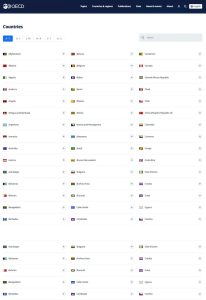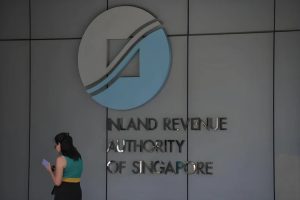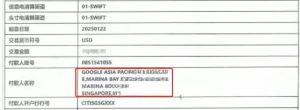As the trend toward international tax transparency accelerates, the Common Reporting Standard (CRS) initiated by the Organization for Economic Cooperation and Development (OECD) has become one of the core mechanisms for global financial compliance.
As an international financial center, Singapore has been participating in CRS automatic information exchange with multiple countries, including China, since 2018. Meanwhile, some cross-border creator platforms (such as Google AdSense) require users to submit “Singapore tax information” due to their global payment structures to ensure proper withholding tax processing.
Especially for Chinese tax residents, obtaining the “Certificate of Chinese Tax Residency” document and completing platform tax information submissions have become critical compliance challenges for cross-border income earners.

I. CRS Global Taxation Mechanism
China-Singapore Information Exchange
1. The Global Framework of CRS and China’s Participation
CRS is an international standard for the automatic exchange of financial account information established by the OECD in 2014. It requires participating countries’ financial institutions to collect information on their clients’ tax residency countries and report it annually to their domestic tax authorities, which then automatically share this data with other tax authorities via the OECD.
By 2025, over 117 jurisdictions worldwide have committed to implementing this mechanism. China signed the CRS Multilateral Agreement in 2016 and began requiring domestic financial institutions to conduct due diligence starting in July 2017, with the first round of exchanges commencing in September 2018.

Source: OECD
2. China-Singapore CRS Information Exchange Arrangements
Under the CRS multilateral agreement signed between China and Singapore, Chinese tax authorities can obtain account information from financial institutions in Singapore through CRS, including account balances, interest, dividends, insurance contracts, and other information.
The Singapore IRAS and Chinese tax authorities share data through the automatic exchange mechanism, which has been in operation since 2018. The reported content includes core items such as taxpayer name, tax identification number (TIN), account balance, and type of income.
3. Global Income Reporting Obligations for Chinese Tax Residents
Pursuant to Article 13 of China’s Individual Income Tax Law, tax residents are required to report and pay taxes on their global income (both domestic and foreign) and complete the reporting process between March 1 and June 30 of the following year.
The CRS automatic exchange mechanism has enhanced the ability to identify individuals who have not reported overseas income, and Chinese tax authorities at all levels have utilized this information to conduct proactive audits and collection actions.
Therefore, even if income is sourced from Singapore, Hong Kong, or overseas platforms, as long as the individual meets the criteria for Chinese tax residency, they must file a tax return in accordance with the statutory procedures.

Source: OECD

II. Singapore’s Tax System Structure
and CRS Compliance Requirements
1. Singapore’s Territorial Taxation System and Tax Advantages
Singapore adopts a territorial taxation system, meaning it only taxes income sourced from Singapore. Overseas income that is not repatriated to the local jurisdiction is generally not subject to taxation.
Personal income tax rates are progressive, with the highest rate reaching approximately 22%. Capital gains tax is extremely low, and there are no inheritance or gift taxes. Corporate tax also offers numerous incentives, making Singapore a tax-friendly jurisdiction for global investors and businesses to establish operations.

Image source: Lianhe Zaobao
2. Financial Institutions’ Compliance Obligations Under CRS
According to the CRS guidelines issued by the Singapore Inland Revenue Authority (IRAS), all financial institutions (including banks, securities firms, and insurance companies) must conduct CRS self-certification, identity verification, and tax residency identification for account holders, and report compliance information to the IRAS in accordance with the law.
Institutions must collect data such as the holder’s name, address, Tax Identification Number (TIN), account balance, and income details. IRAS updated its CRS FAQ, XML reporting templates, and status inquiry functions in 2024 to enhance consistency and feedback capabilities.
3. Audit Trends and Compliance Penalty Warnings
IRAS obtains millions of account information records annually through the CRS exchange mechanism. As of 2024, the amount of taxes collected has reached hundreds of millions of Singapore dollars.
In contrast, Chinese tax authorities have also launched large-scale audits in multiple coastal regions, recovering taxes and imposing fines on individuals who failed to report overseas income, with the ability to retroactively recover taxes for up to five years. CRS compliance has evolved from an international standard to a domestic legal obligation.

III. Google AdSense Requirement to Submit
Singapore Tax Information: Background and Operational Process
1. Why are Chinese users required to submit Singapore tax information?
Google AdSense payments for users in mainland China and Hong Kong are made by “Google Asia Pacific Pte Ltd” (a Singapore-based company), so the AdSense backend requires users to fill in “Singapore tax information.”

Image source: Google AdSense
This process is primarily to ensure that withholding taxes comply with Singapore CRS and tax law requirements, and to avoid payment delays or incorrect tax deductions.
Google’s official statement notes that failure to provide tax information may result in delayed payments or withholding taxes at a higher rate (or the default maximum rate); submitting valid information will allow for lower rates or tax exemptions based on tax treaties between signatory countries (e.g., the China-Singapore agreement).

Image source: Google AdSense
2. Standard Process for Obtaining Proof of Chinese Tax Residency
The following is the mainstream process (based on authoritative media and tax system guidelines):
① Log in to China’s “Natural Person Electronic Tax Bureau” using the Individual Income Tax App to scan and log in;
② Go to “Tax Services” → ‘Other’ → select “Issuance of Chinese Tax Resident Status Certificate”;
③ Select the application year (e.g., 2025), enter “Republic of Singapore” for the other country, and optionally leave the remarks field blank;
④ The system will verify your competent tax authority and identity information; click “Continue”;
⑤ Fill in the application details, including: whether there are any format requirements, the purpose of the application is “to enjoy treaty benefits,” the name of the foreign taxpayer is “GOOGLE ASIA PACIFIC PTE LTD,” the applicable tax treaty name, the proposed treaty income amount, upload the cooperation agreement with Google (optional to include a download link for the agreement), ID card and household registration book photos, optional Google payment proof, etc., and select “electronic delivery” as the delivery method;
⑥ After submission, the tax authority typically completes the review within 7 working days. You can query and download the electronic certification document via the system. This document can then be uploaded and used in the AdSense tax module.

Image source: Natural Person Electronic Tax Bureau
3. Impact and considerations after submitting tax information
After uploading this certification, the AdSense system status will display “Under review” → “Accepted.” The review period may take up to 7 business days.
Once accepted, Google will apply the reduced tax rate under the China-Singapore agreement; otherwise, payments may be delayed or default to a higher withholding tax rate.
According to actual feedback from Reddit users, submitting tax information earlier can help reduce payment issues and ensure timely application of the appropriate tax rate.

↑Internet image, remove if infringing

IV. Compliance Recommendations and Operational Guidelines
Under the Context of Chinese Tax Residency
1. Clarify Tax Residency Status and Reporting Standards for Overseas Income
Chinese tax residents must confirm whether they meet the residency criteria and strictly report all global income in accordance with legal provisions.
Regardless of whether income is actually remitted into the country, any income paid by creative platforms or financial institutions falls within the scope of required reporting. Obtaining a tax residency certificate in a timely manner helps ensure accurate information entry on international payment platforms and the lawful enjoyment of treaty benefits.
2. Reasonable Structural Optimization and Avoidance of Illegal Tax Avoidance Arrangements
While some individuals may hold offshore assets through structures such as offshore companies or trusts, the CRS mechanism now covers various account types, requiring financial institutions to identify beneficial owners and report relevant information.
Chinese tax authorities have also strengthened anti-tax avoidance measures (such as the General Anti-Avoidance Rule, GAAR) to regulate shell arrangements. Proper compliance requires proactive disclosure of information and avoidance of unrecognized tax avoidance arrangements.

↑Internet image, remove if infringing
3. Proactively Use CRS Data for Self-Inspection and Document Preparation
CRS data exchange has been widely implemented, and tax authorities can monitor suspected underreporting through the system and initiate audits.
It is recommended that individuals proactively verify whether they have overseas accounts, insurance, investment products, etc., and prepare relevant contracts, payment vouchers, statements, and other documents for verification. Timely rectification of underreporting can help reduce future penalty risks.
4. Accurately submit tax residency certificates to enjoy treaty benefits
When submitting certificates, ensure the treaty name is accurate, e.g., “Agreement Between the Government of the People’s Republic of China and the Government of the Republic of Singapore for the Avoidance of Double Taxation and the Prevention of Fiscal Evasion with Respect to Taxes on Income”;
Ensure income amounts are reasonable, taxpayer names accurately match the payer (GOOGLE ASIA PACIFIC PTE LTD), and uploaded attachments (agreement, ID card, household registration book photo, payment records) are clear and complete.
After uploading, monitor the status in the Google backend. If rejected, you may re-upload clearer documents or delete the incorrect documents and resubmit.
Conclusion: The CRS automatic information exchange mechanism is increasingly enhancing global tax transparency, with Singapore playing a significant role in this mechanism.
For Chinese tax residents, even payments from overseas platforms such as AdSense, YouTube, and Google trigger Singapore tax compliance requirements.
Therefore, promptly obtaining the “Certificate of Chinese Tax Resident Status” through the Natural Person Electronic Tax Bureau, uploading it to the Google AdSense backend, and completing Singapore tax information as required are critical steps to ensure legal compliance, avoid payment delays and high withholding taxes, and protect your international economic rights.
Additionally, in conjunction with China’s tax laws regarding global reporting requirements, proactively reporting overseas income, standardizing platform operations, and understanding CRS compliance rules will effectively reduce future audit and legal risks.
This article aims to provide cross-border creators, individuals with overseas income, and holders of financial assets with a clear and actionable compliance pathway. If you have friends facing confusion about submitting tax information to AdSense, and if you have more practical experience, please feel free to share and discuss further. Wishing you smooth compliance and worry-free overseas income!
Note: Reference materials are sourced from Singapore’s IRAS, MAS, EDB, Lianhe Zaobao, China’s Natural Person Electronic Tax Bureau, OECD, PwC, KPMG, Google AdSense, YouTube, and compiled from comprehensive public news reports. Reproduction must credit the source; please contact us for removal if necessary. …
